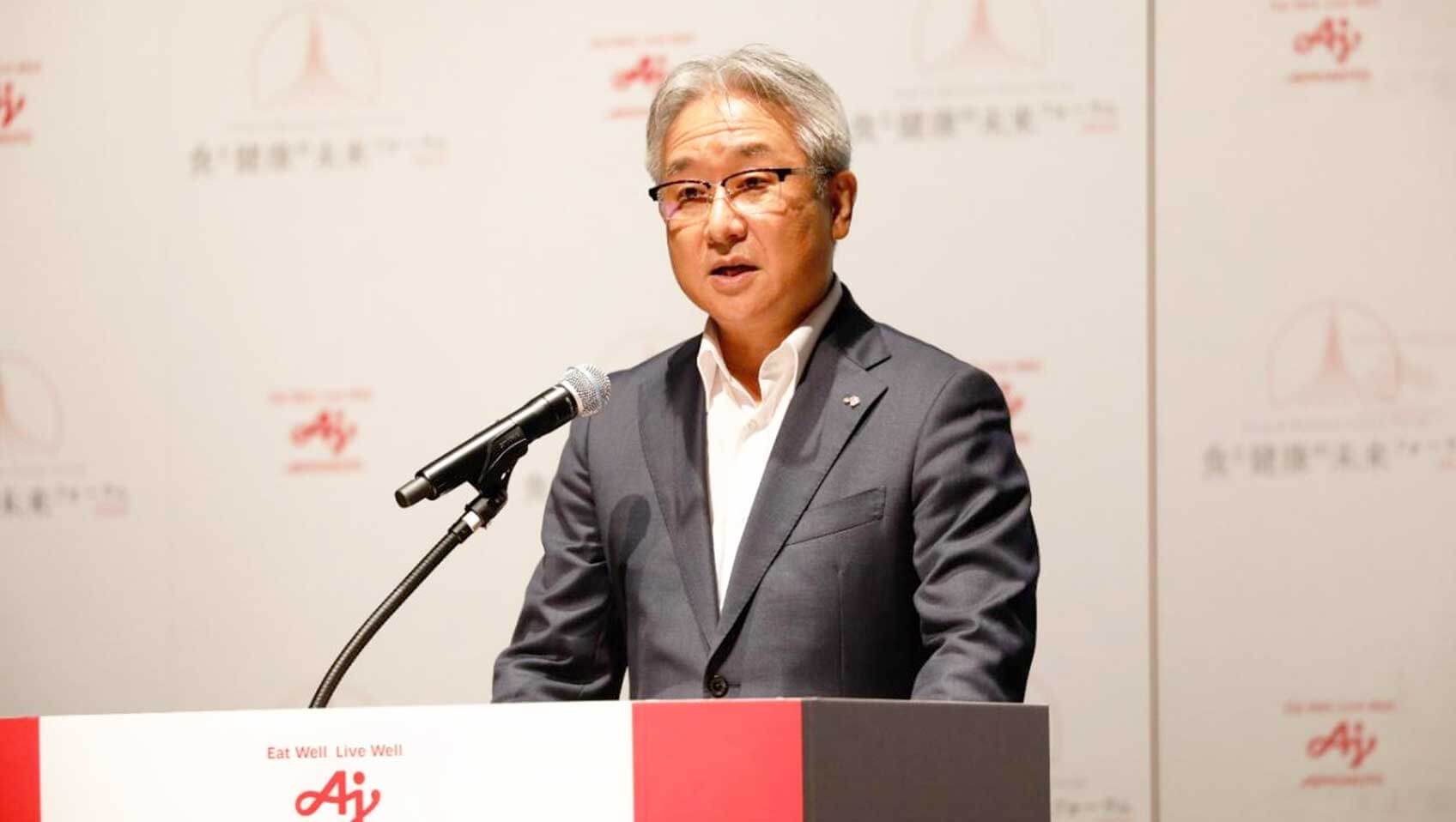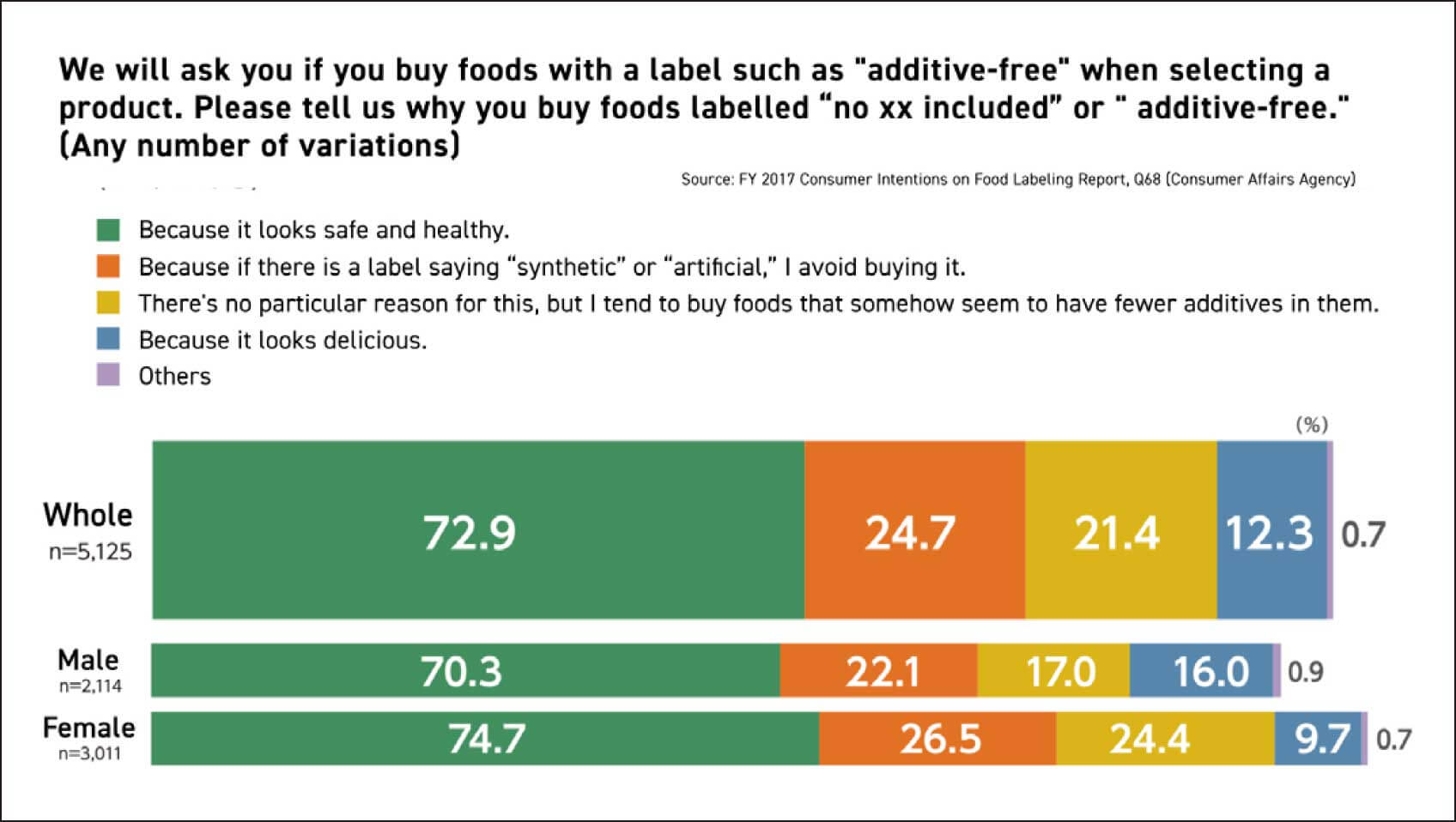2020 “Food & Wellness Future Forum” Part 1
The First “Food & Wellness Future Forum” held on August 31, 2020
Ajinomoto Co., Inc. held the “Food & Wellness Future Forum” on Monday, August 31, 2020, as a specific initiative for the company to provide accurate information to address social issues caused by rumors and inadequate information about food. The Forum served to answer many questions from consumers and gain their understanding.
This first “Food & Wellness Future Forum” centered on the theme “Why don’t we think about food additives? Why do we care about additive-free foods?” It addressed concerns and misconceptions about food additives that have remained unresolved for years. In addition to celebrity guest, Ms.Suzanne, we were joined by experts and industry representatives to discuss food additive safety and safe food choices. More than 1,300 viewers participated simultaneously (total number of viewers: 2,600). The following is a report of the event.
Opening Remarks
Why did you organize the “Food & Wellness Future Forum?”
“I think it is very difficult to assess the validity of information these days because a lot of the information we encounter in our daily lives is inaccurate or even, incorrect. People are especially sensitive to information about food safety. Whenever there is the slightest doubt about the safety of food, the sense of alarm spreads quickly throughout the world, and we are bombarded with both correct information and uncertain information that can cause anxiety. It takes a long time to resolve such a situation, and before people can feel safe again, many social burdens are imposed.”

“Today, information is everywhere. Unverified sources such as social networking sites increases the risk of being misled by so-called “fake news.” This is why we need a place where accurate information about food can be shared with society as a whole. What is especially important, is information about food safety and security, which is essential for enjoying food and living a healthy life. We need a place where people can discuss their concerns and questions until they reach a mutual understanding, which is why we held the ‘Food & Wellness Future Forum’.”
“We hope that this forum will help to resolve any doubts or sense of mistrust you have right now. We hope our efforts today will enrich your eating habits by enabling you to enjoy eating with peace of mind from tomorrow.”
――Takaaki Nishii (Representative Director, President & CEO of Ajinomoto Co.)
Speaker
Moderator
Mr. Kenichi Shimomura
President of Reiwa Media Institute, and
Director of Literacy at Japan Internet
Media Association (JIMA)
Guest
Ms. Suzanne
Celebrity
Panelists
Mr. Ken Ogiso
Information Literacy Specialist
Ikuko Nakamura, PhD
Chief of Nutrition Department of Home
Care Services Division of Jieikai
Hospital, Medical Corporation
Fukujukai, and Vice President of Japan
Home Nutrition Management Society
Hideaki Karaki, DVM, PhD
Professor Emeritus at the University of Tokyo, and President of the Foundation of Food Safety and Security
Ms. Chikako Futamura
Executive Officer and General Manager of Organization Promotion Division at Japanese Consumers’ Co-operative Union
Mr. Shunji Saito
Manager of QC Department and QC & Logistics Management Division at Seven-Eleven Japan Co., Ltd.
Mr. Takaaki Nishii
Representative Director,
President & CEO of Ajinomoto Co.
Find out why the term “additive-free” is preferred and food additives are
disliked.
Nearly half of the people surveyed by the Consumer Affairs Agency buy food with an “additive-free” label.
Shimomura: I’ll get right to it, Ms. Suzanne, what do you think about additive-free foods?
Suzanne: I’m quite relaxed when it comes to additive-free products. I think it’s more important to have a delicious and enjoyable meal. However, if I had two products, one with food additives and one without, I would choose the one without food additives. In fact, my child loves sausage so much that he says, “My favorite dish my mom makes is white rice and sausage.” But I really wonder if I should feed my child sausage every day because of comments on social media, and being told by friends that it’s not good for him to eat, as sausage contains a lot of food additives which is not good for his health. So, I’d like to ask you about this today. Of course, neither choice is simply good or bad, but given this opportunity today, I want to know if we can safely eat a variety of things, and I think for peace of mind, my mom friends would be interested to hear about that too.
Futamura: At the Co-op we receive a certain number of inquiries from our members about food additives every year, such as “I don’t want you to use this or that (specific food additive)” or “Is this used in your product?” I’m sure the people who call us are worried.
Karaki: Of course, food additives and pesticides are used because they have been tested rigorously to ensure their safety, but it is also true that food additives are disliked. This is because some people still have memories from the past, such as the pollution that occurred in the 1960s, and have developed the concept that chemicals and food additives should be avoided. For example, the term “chemical seasoning” used to mean something good, but as issues with pollution have emerged, it turned into something bad because of the word “chemical” attached to it.
Shimomura: Here are the results of a survey on food labeling attitudes conducted by the Consumer Affairs Agency in 2017. Which of the following would be your answer, Ms. Suzanne?

Suzanne: If the price is the same, I’d answer, “If it’s the same kind of food, I’ll buy the one with a label that says ‘no xx included’ or a label that says additive-free.”
Futamura: In fact, I don’t think it’s possible to strictly compare exactly the same kind of food, one containing additives and one without, because the price, amount, and size of each product would be different. In that sense, I didn’t see that big of a difference between the orange and yellow sections of the graph. I think that depending on the situation, there would be some people who would be confident in their choice, and others who would not.
Suzanne: Just because it’ s labelled additive-free doesn’t mean you are going to check the back of the package to find out the ingredients in detail. Maybe you’re buying it because somehow you think you’re being “good” by buying food without food additives.
Shimomura: In addition, there are two groups of people at both ends of the spectrum: one group convinced that they will not buy foods with food additive labels (the red part of the diagram above), and another group convinced that they will buy foods with food additive labels (the same, blue part). Today, instead of “deciding who is right” between these two groups, each acting in opposite ways with certainty, we should try to reveal the fact that each group does not understand how the other group thinks. If there is mutually unknown information, each group can learn something new or begin a mutual understanding. I hope we can reach the threshold of such communication.
Karaki: There’s a big difference between the group of about 10% who chose “I always buy food with a label that says no xx included or a label that says additive-free” and the 40% who say they would buy additive-free if given the choice. If they really didn’t like food with food additives, they would definitely buy additive-free foods. The reason why 40% of the respondents chose this response is because information abounds about the dangers of food additives, and they think that if they answer “I’m not worried about food additives,” they will be told that they are wrong. It’s often said that Japanese people undergo a lot of ‘sympathy pressure.’
More than 70% of the reasons people buy food with an additive-free label are because it seems
safe and healthy. Are humans more likely to believe dangerous information?
Shimomura: Let’s take another look at the results of the survey. What are the reasons for purchasing products with labels such as “no xx included” and “additive-free?”

Suzanne: I think I would choose “Because it looks safe and healthy” because I feel more confident with the image of myself buying the additive-free label. Sometimes I buy prepared foods, but when I do so, I hide them at the bottom of the supermarket basket, and when I buy additive-free, I put them at the top so that they can be seen. I guess I’ m just an unreasonably vain person.
Futamura: As for this matter of ‘looking good,’ even at the Co-op, we receive inquiries, such as, “I saw this information on TV and on the Internet. Do you use these food additives?” Even if they are not aware of it, I have the impression that many of them are thinking and acting based on the information they are getting.
Karaki: It means that we are greatly influenced by information. There are many articles on the Internet and in weekly magazines that say synthetic preservatives and artificial sweeteners are bad for your health. And humans have an instinct to never let dangerous information go unheard. It’s only natural to believe that you and your family will be safer if you believe such information.
Shimomura: But it would be a shame if that belief resulted in your having to respond more than necessary, and if your daily life was affected on a level of “I wish I hadn’t had to go that far.” It’s very important to know where to get your information. I want to say this to Ajinomoto Group: if you think that “food additives are safe,” then I think you haven’t yet sufficiently explained your reasons for doing so. I’m sure you’ve had a hard time dealing with it so far, but instead of repeating your assertion that “it’s safe” a hundred times, I think you should start by asking consumers what the source of their concern is.
Karaki: You’re right. We have an instinct to be more influenced by dangerous information, so we ignore safety information. There is no danger in ignoring it. That is why I believe that if we don’t release a lot of safety information, we will lose out to the dangerous information, and that we can’t win unless we release about ten times as much safety information as dangerous information.
Shimomura: I also wondered, if the idea of “vigilance for food additives” exists, then so does its opposite, “no vigilance for additive-free.” Just because something is additive-free, everyone believes that it is safe, but is it really?
Karaki: In fact, it is very difficult to make processed foods completely additive-free. There are some food manufacturers that call their products additive-free when they exclude only the preservatives and colorings, which consumers dislike, these are so-called “additive-free.” Some people mistakenly believe that this “additive-free” is good for you, or that it contains no food additives whatsoever. You could say that they are not vigilant about additive-free products.
Futamura: The Co-op has a “Co-op” brand, but it has a voluntary standard that it does not simply label our products as being additive-free. There is almost no labeling of “additive-free” to the extent that only products that meet certain conditions are labeled as “no colorant” or “no bleach,” but in fact, it may not be very well recognized. It wouldn’t be fair if it wasn’t clear why they are labeled as such.
